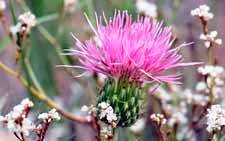Argemone pleiacantha, Southwestern Pricklypoppy
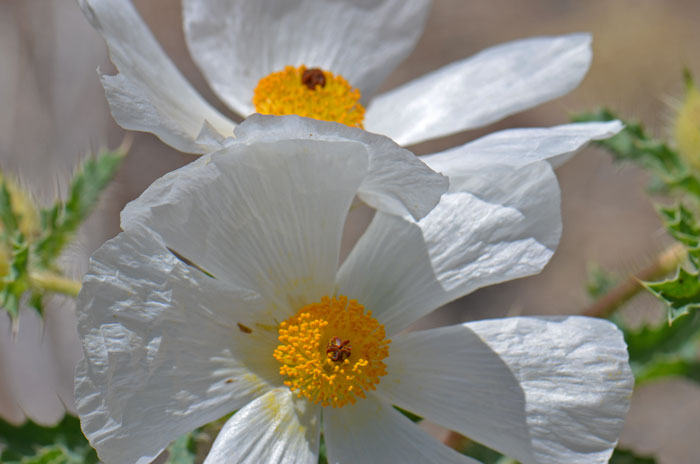
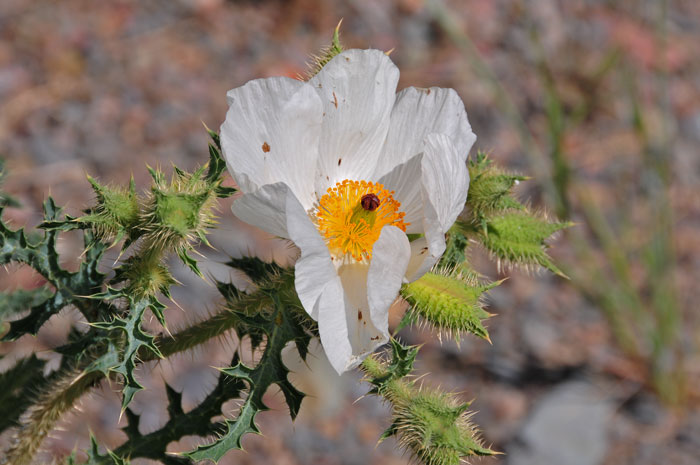

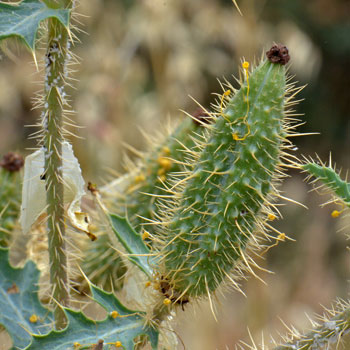
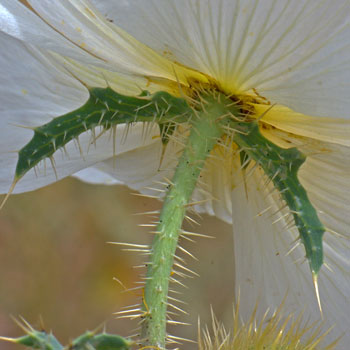
Scientific Name: Argemone pleiacantha
Common Name: Southwestern Pricklypoppy
Also Called: Bluestem Pricklepoppy, Cowboy's Fried Eggs, Southwestern Prickly Poppy (Spanish: Cardo, Chicalote)
Family: Papaveraceae or Poppy Family
Synonyms: (Argemone pleiacantha var. pinnatisecta)
Status: Native
Duration: Annual or perennial.
Size: Up to 4 feet or more.
Growth Form: Forb/herb; branching erect stems, entire plant covered sparingly with prickles.
Leaves: Green, blue-green; divided into lobes, sometimes clasping the stem.
Flower Color: White, with yellow stamens, flowers large and showy, buds oblong-obovoid or subglobose, prickly, with horns, fruit is a capsule.
Flowering Season: Usually throughout the year.
Elevation: 1,500 5,000 feet.
Habitat Preferences: Washes, slopes, roadsides, plains and disturbed soils.
Recorded Range: Argemone pleiacantha, or Southwestern Pricklypoppy is rare in the United States where it is found only in Arizona and New Mexico under 3 sub-species. In Arizona it occurs throughout most of the state with few records in Yuma County. In New Mexico it is found in 3 counties. the federally listed Endangered sub-species Argemone pleiacantha subsp. pinnatisecta, known as the Sacramento Prickly Poppy is found only from the western slopes of the Sacramental Mountains.
Southwestern Pricklypoppy is also native to northwest Mexico and possibly Baja California.
North America & US County Distribution Map for Argemone pleiacantha.
U.S. Weed Information: No information available.
Invasive/Noxious Weed Information: No information available.
Wetland Indicator: No information available.
Threatened/Endangered Information: Argemone pleiacantha subsp. pinnatisecta, Sacramento Prickly Poppy found only in New Mexico, is listed as Endangered by the USF&WS and also by the State of New Mexico.
Genus Information: 17 species in Argemone listed in Plants.usda.gov; 6 species in Arizona, 2 species in California, 5 species in New Mexico and 8 species in Texas.
There are 3 sub-species in Argemone pleiacantha in North America:
Argemone pleiacantha subsp. ambigua, Southwestern Pricklypoppy, AZ;
Argemone pleiacantha subsp. pinnatisecta, Sacramento Prickly Poppy NM Endangered
Argemone pleiacantha subsp. pleiacantha Southwestern Pricklypoppy, AZ and NM
The Plant List includes 32 accepted species world-wide for the genus Argemone.
Comments: Southwestern Pricklypoppy is difficult to identify correctly in the field from other closely related species similar in appearance.
In Southwestern Desert Flora also see, Sonoran Pricklypoppy, Argemone gracilenta.

